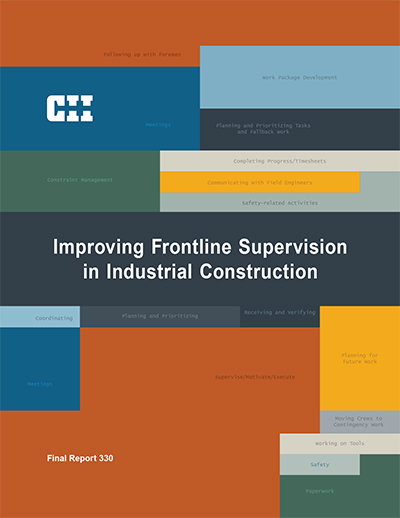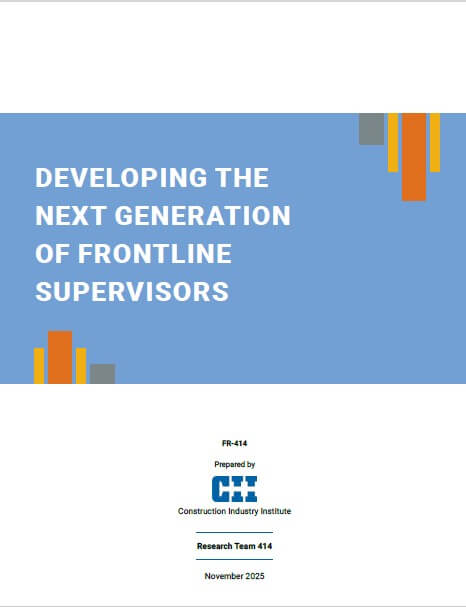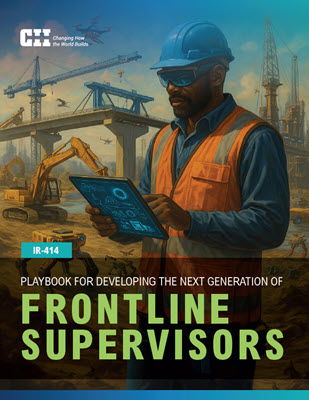
Improving Frontline Supervision in Industrial Construction
Frontline supervisors – foremen and general foremen – are the managers who translate construction execution plans into productive action. Despite their importance, they have been comparatively understudied. Recent productivity research has focused on new techniques, such as Advanced Work Packaging (AWP), or worker shortages and the lessening of craft skills. However, to implement any productivity improvement initiatives or to address worker skills, it is imperative to focus on the capabilities of foremen and general foremen. In order to conduct this research, limited to industrial construction, Research Team 330, The Role of Frontline Supervision in Improving Construction Productivity and Performance (RT-330), addressed frontline supervision in two ways:
1. The competencies of foremen and general foremen – RT-330 identified 10 core competencies, composed of a host of specific skills. These competencies are uniform across productivity regimes, varying only in detail. The 10 core competencies, in no specific order, encompassed the following specific skills:
- General Construction Knowledge
- Trade-specific Knowledge
- Verbal Communications
- Written Communications
- Pre-Planning
- Problem Solving
- Ethical Value System
- People Management
- Leadership
- Proactive and Goal-driven
This research validated the importance of these 10 competencies. The assessment of foremen and general foremen indicates that their levels of competency are lower than desired. Industry investment in frontline supervisor skills – for foremen in particular – is seen as one of the biggest opportunities for the industry to improve productivity and performance. This assessment is supported by low levels of training self-reported by both foremen and general foremen.
2. How frontline supervisors allocate their time across common tasks – RT-330 members identified specific tasks with reference to the common activities – from field leadership to administration – undertaken by foremen and general foremen during a typical day. The team developed a target time per activity – a range that reflects the most productive allocation to each task, considering the variety of activities that frontline supervisors must perform.
The team’s principal research findings were that foremen and general foremen, in aggregate, spend time on tasks in ways that are not productive compared to a target allocation. At an industry level, this indicates an enormous opportunity for improvement. The researchers discovered that training in AWP techniques improved foremen and general foremen’s time allocation on many tasks. This research provides added support for investment in AWP by the industrial sector.
The RT-330 research identified significant opportunities to enhance frontline supervisor skills and, thus, ways to improve how foremen and general foremen allocate their time every day. An overarching recommendation is that the industry must collectively invest in frontline supervisor skills. For individual firms, this report concludes with recommendations around screening, onboarding, development, and retention that may help readers to realize sizeable improvements. A summary recommendation around these activities is that firms need to take a deliberate approach to ensure that they select and develop their best talent.
|
These competencies comprise a variety of skills, but their foundations are the same across Foremen and General Foremen.
| Ten Common Activities Foremen Perform Each Day | Eight Common Activities General Foremen Perform Each Day | |||
|
|
|||
Based on its review of the typical responsibilities, RT-330 established daily target time ranges for each of these activities that Foremen and General Foremen perform.
Self-reporting by hundreds of Foremen and General Foremen shows that many are spending time above or below the target for each of their tasks. The spread of time is very wide and indicates a large opportunity for the industry to improve. More time on productive tasks (and less time on required but non-productive tasks) will likely increase field productivity metrics.
Training and education are seen to be lacking among Foremen and General Foremen. While the majority of frontline supervisors report receiving education and training on basic tasks, they self-report having received little training on basic construction management skills (e.g., scheduling and estimating), and even less training on more advanced skills (e.g., 3D models, Lean Construction, and Advanced Work Packaging). These data support RT-330's proposition that the industry is under-investing in education for frontline supervisors.
Both Foremen and General Foremen with AWP training are shown to spend time closer to target times in several areas, suggesting that training does have positive effects beneficial to productivity.
Irrespective of training, on several tasks both Foremen and General Foremen allocated their time closer to target on AWP projects than on Traditional projects. This result supported findings from CII research teams 272 and 319, that AWP increases construction productivity.



